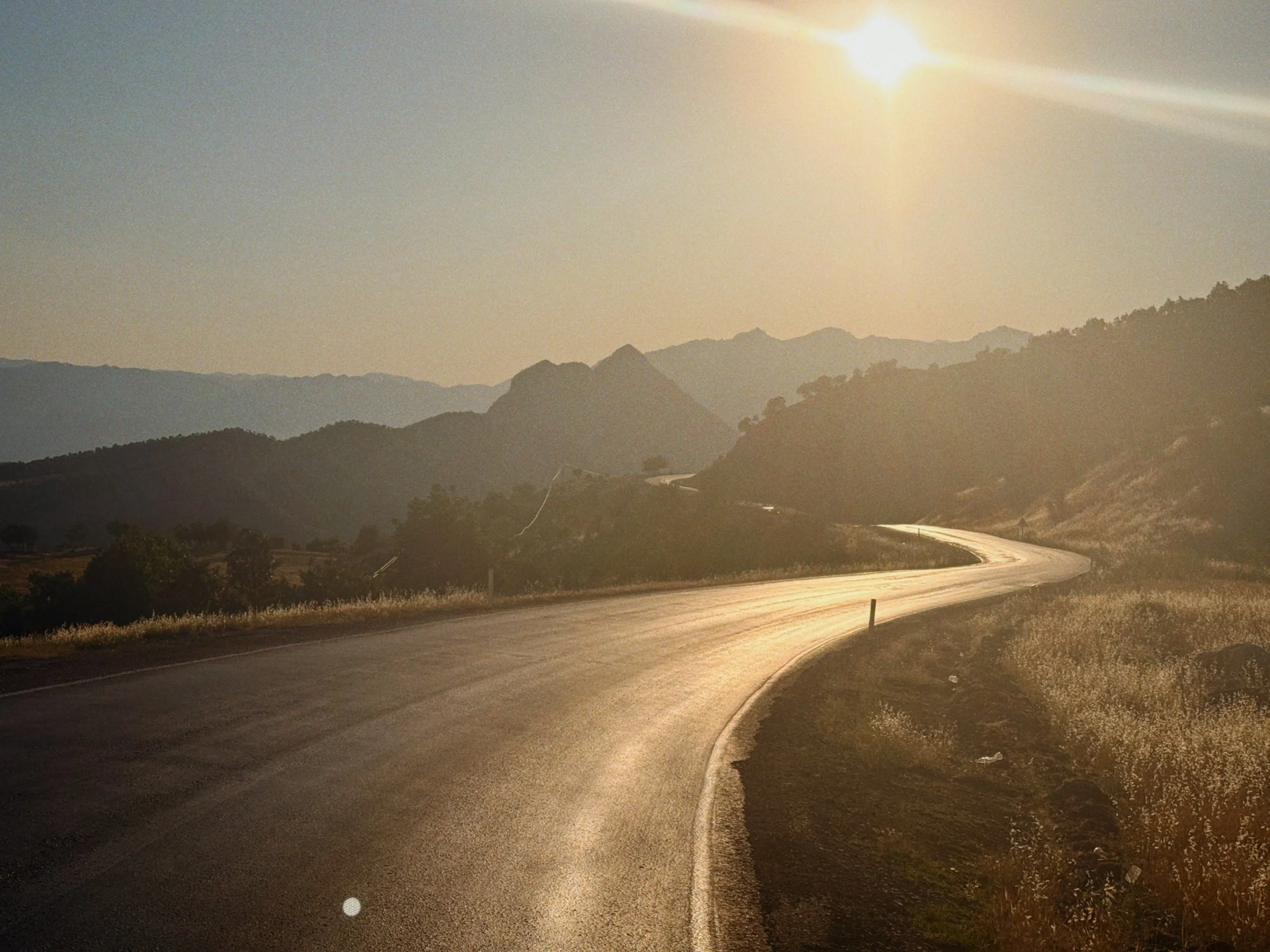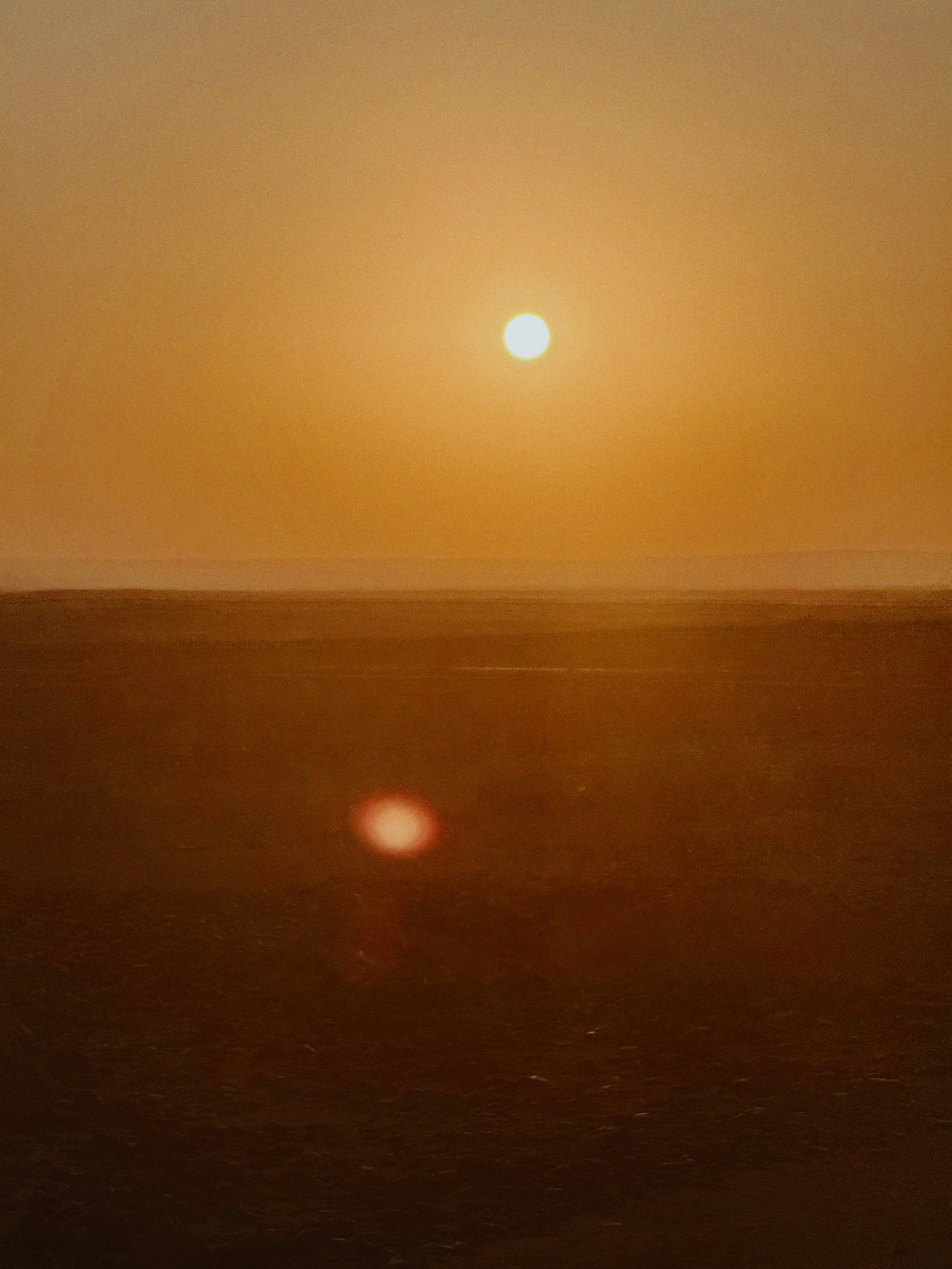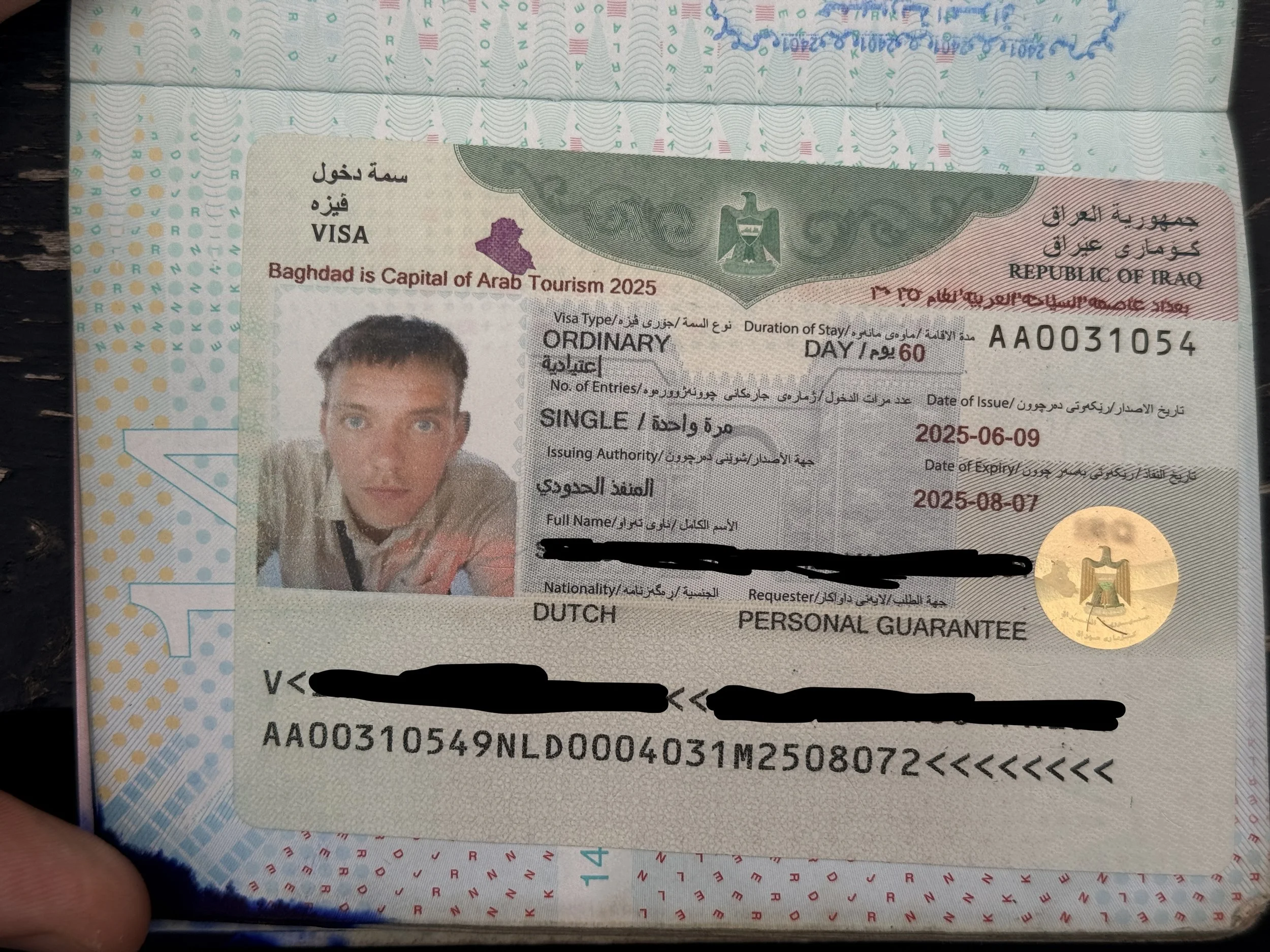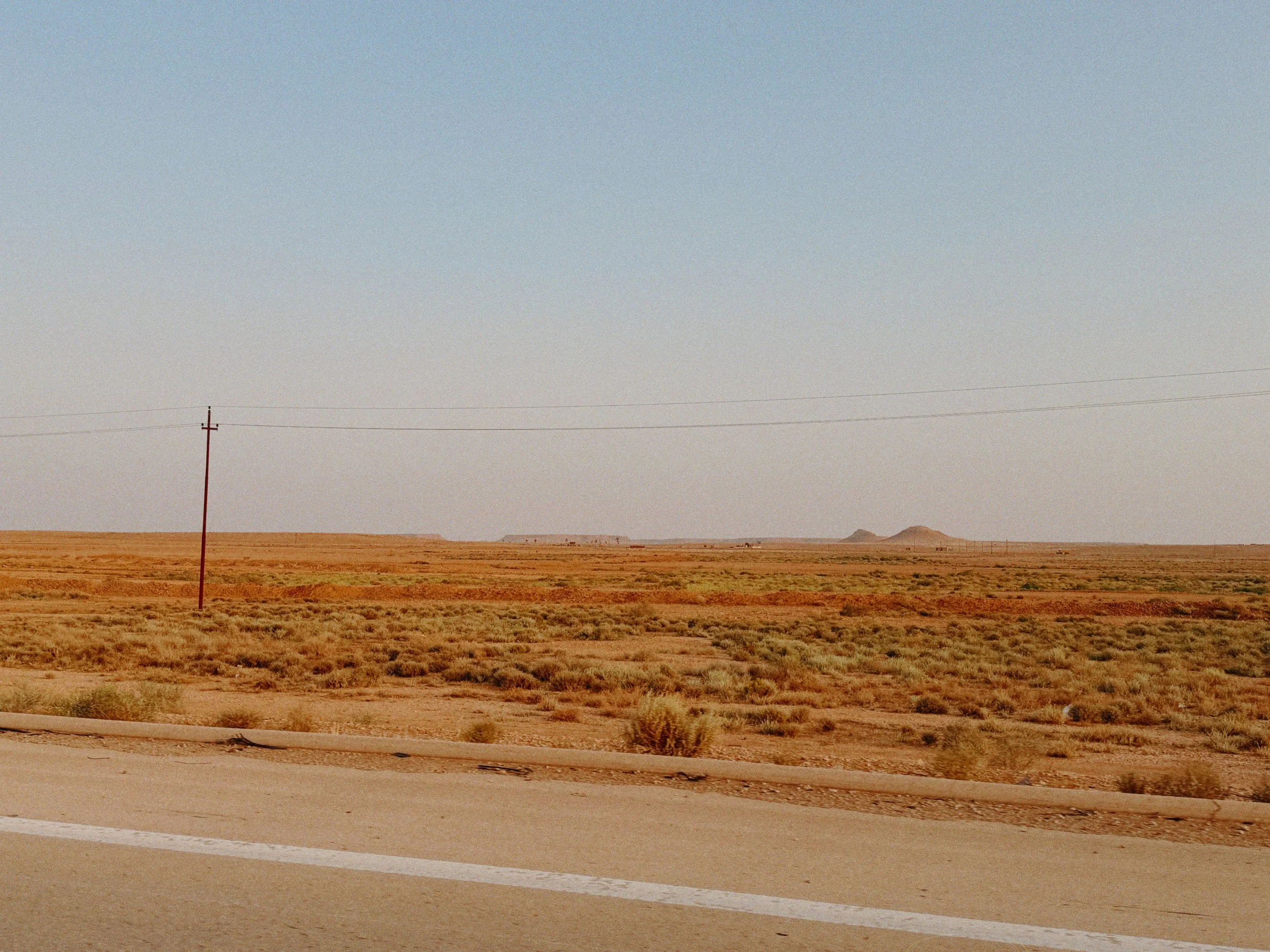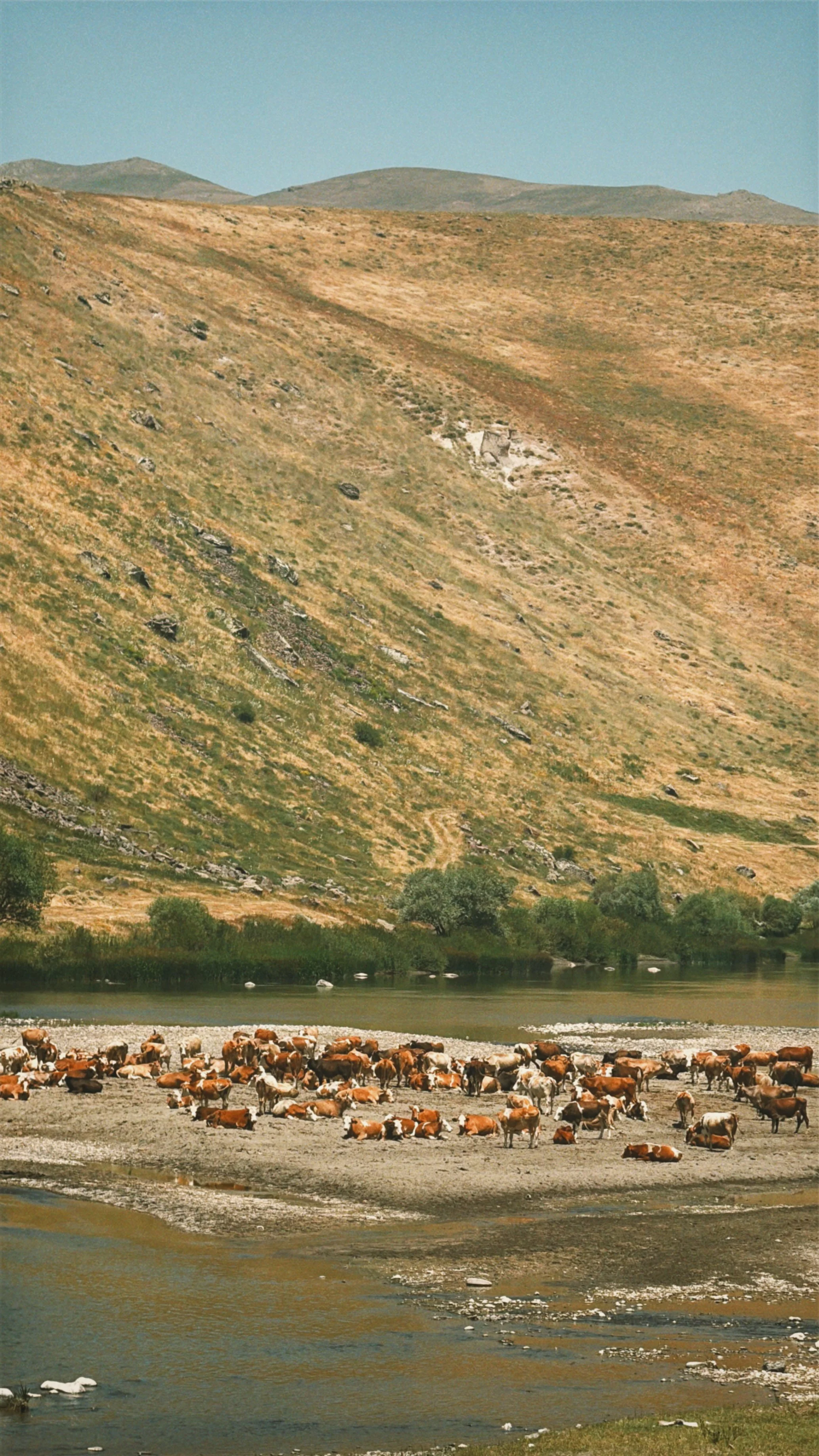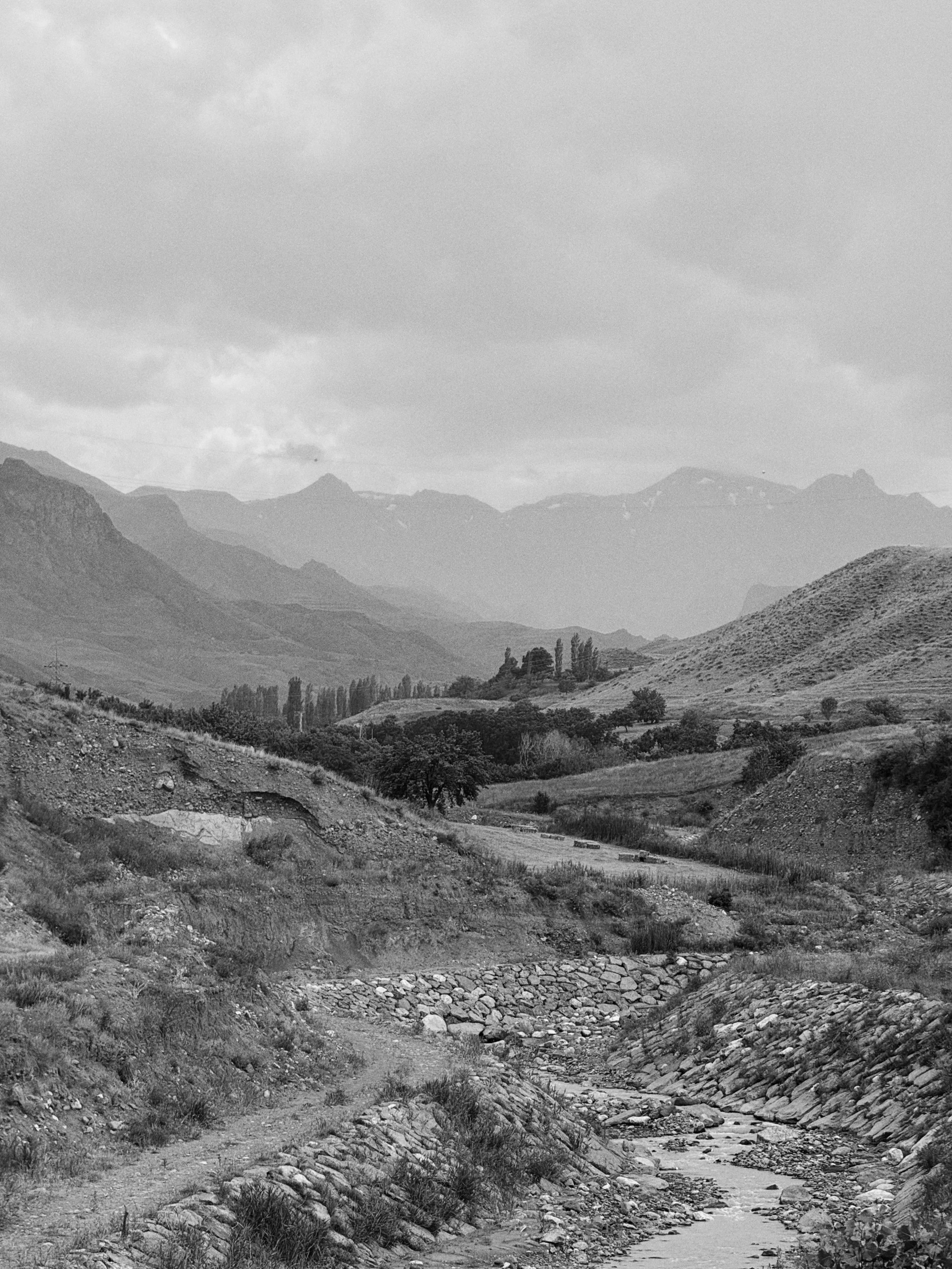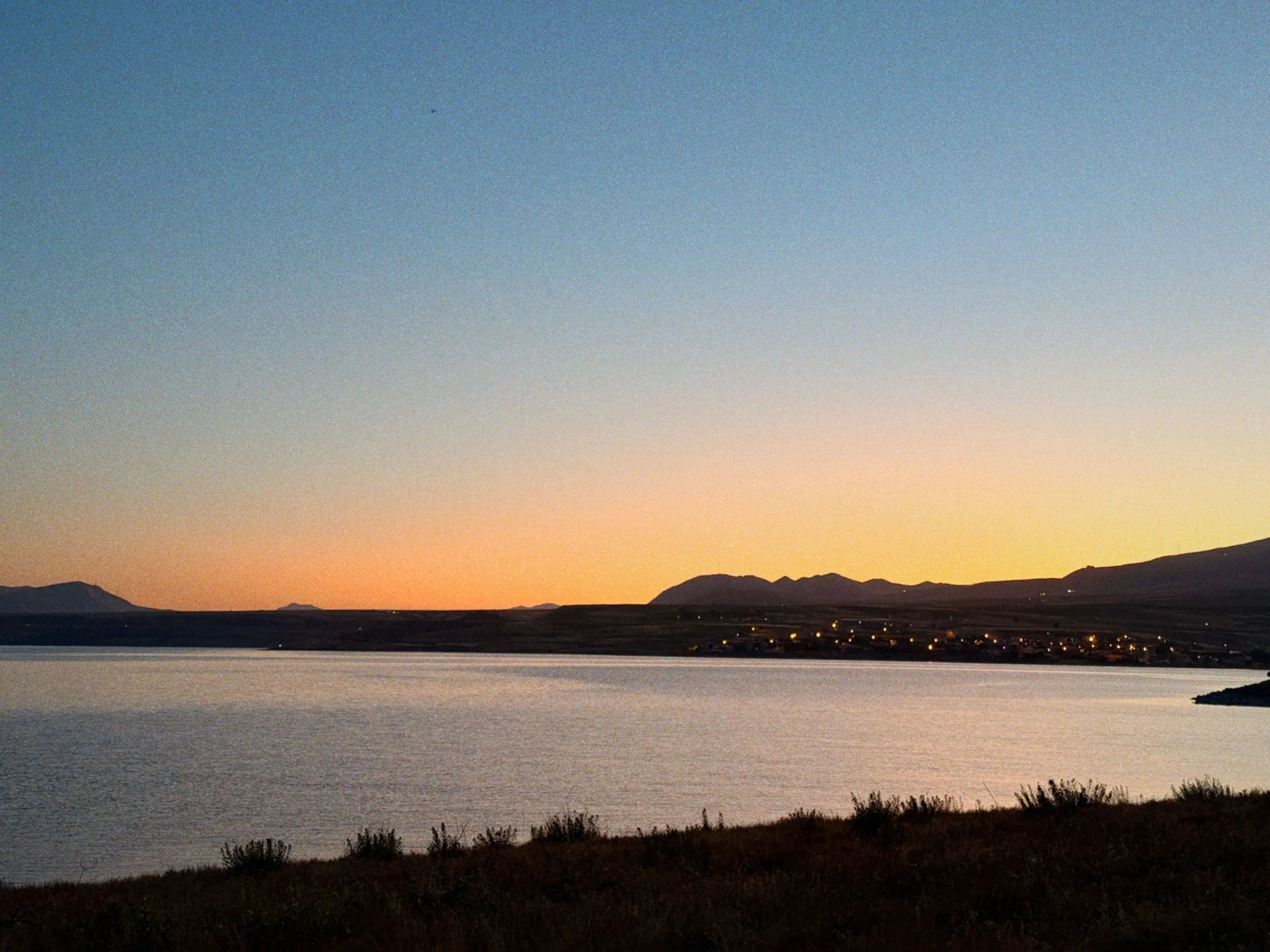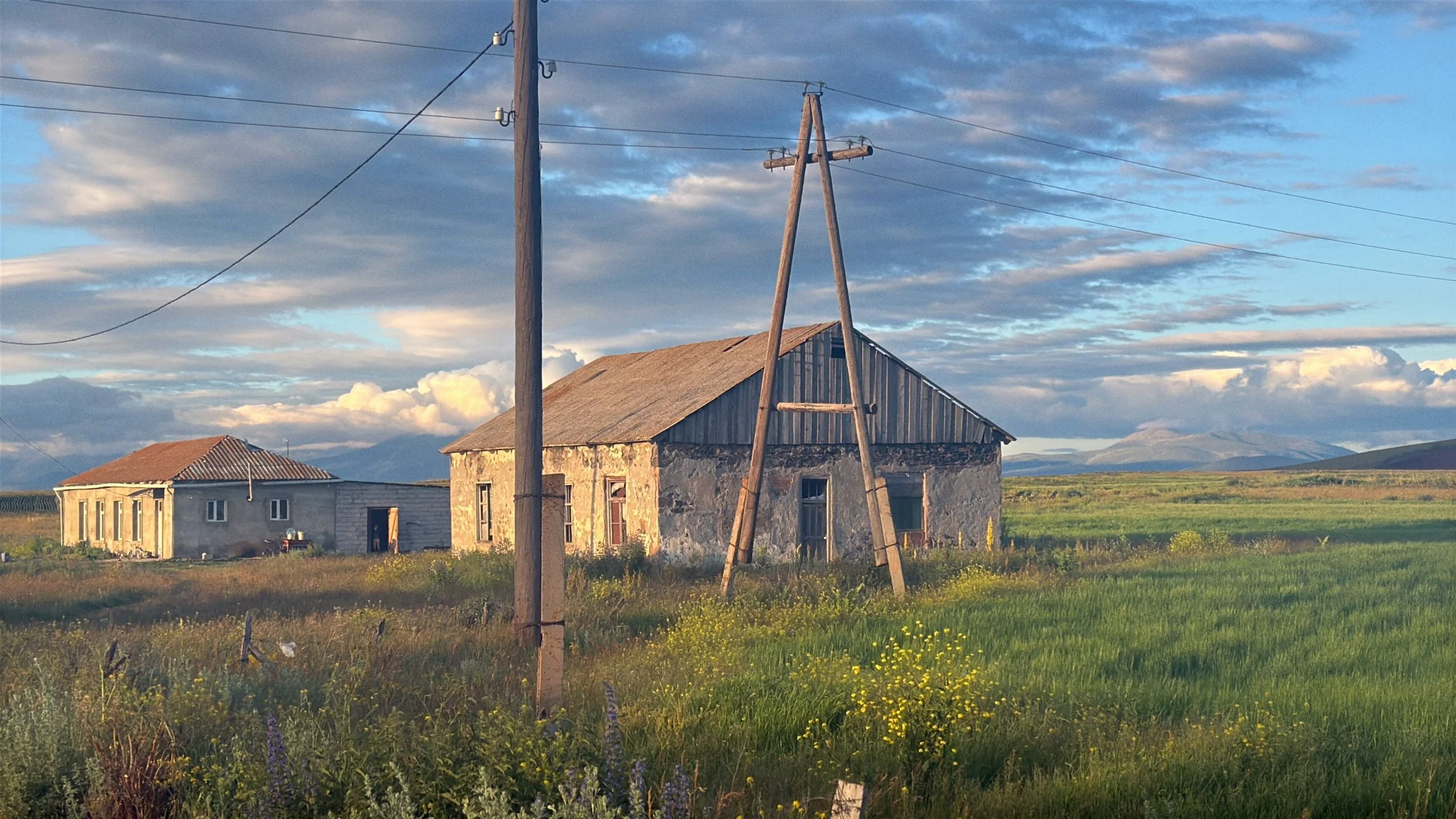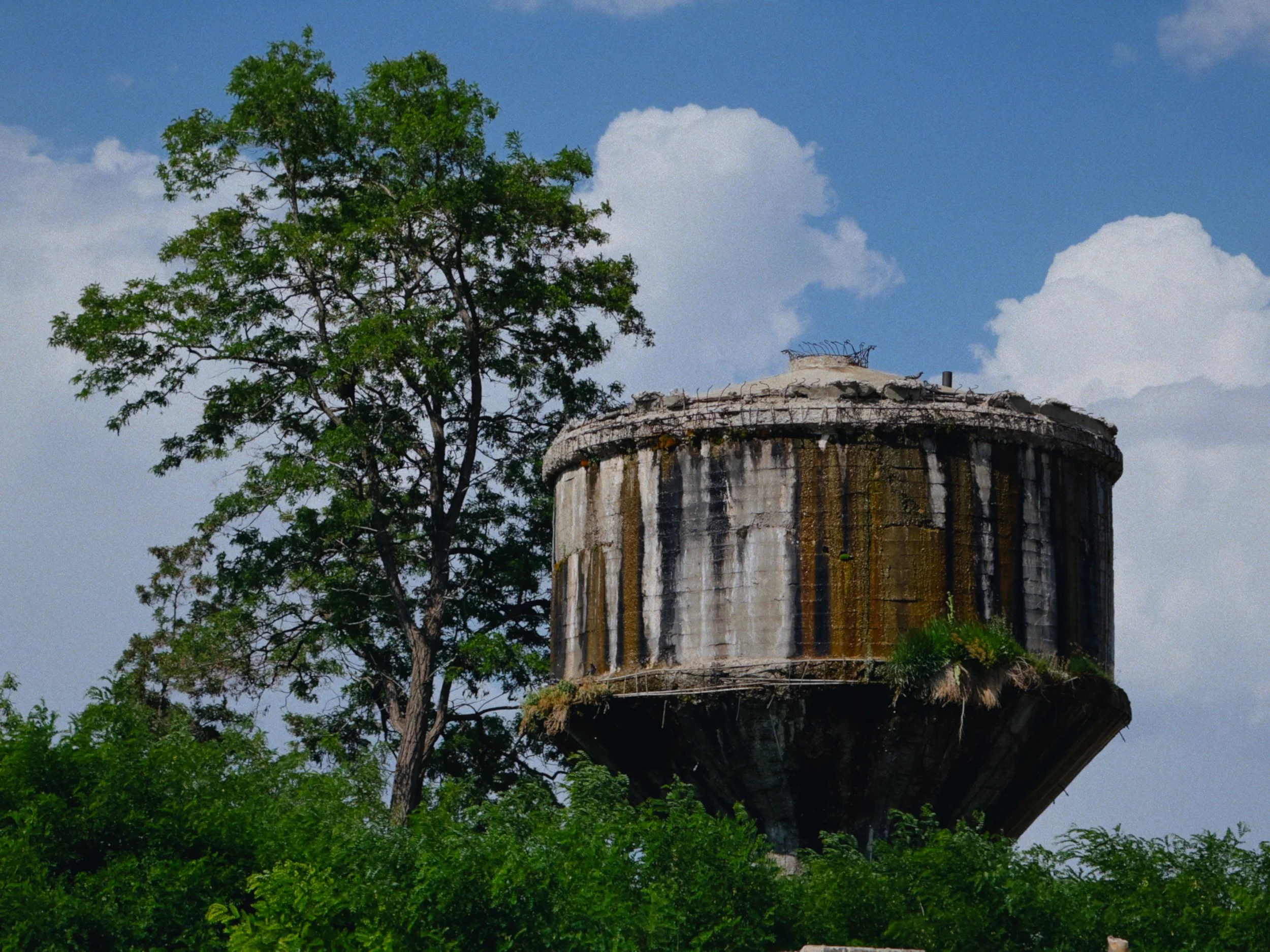📝days 306-403: the frantic desert adventure (jordan, iraq, kurdistan, türkiye & georgia)
Trigger warning: this post mentions child abuse. You’ll get another warning (in the “Iraq” section) so you can safely read until then.
welcome back, dear reader.
Before you start, I’d like to invite you to brew, and then drink, a cup of tea (or coffee, but I’m developing a love for tea as I’ve quit coffee a few weeks back to astounding positive results). I urge you to undertake this activity so that, for the next 15-20 minutes that you’ll spend reading this, you can smell and then taste your steaming cup of warm tea.
If you’ve got good speakers, turn them on. You’ll listen to a few songs I selected as you read further, starting now.
roads, roads, roads
my journey through Jordan, Iraq, Kurdistan, Türkiye & Georgia (this was somewhere in Turkish Kurdistan)
I 📝🔗dropped you off in Damascus, Syria. You watched the sun set over that dizzying arrangement of millennia-old rooftops, and watched me tear up over it. You marvelled in the resilience of Palestinian Abu Saeed who set up a souvenir shop in the mostly-destroyed-but-now-being-rebuilt quarter of Yarmouk. While reading the last piece, you listened to the sweet voice of Fairouz. And at the very end of the Damascus piece, I asked you a question: (how) can we ethically travel in places with complicated regimes, such as Syria? Do you remember?
I’d like to highlight one particularly thoughtful response I got: (highlights are mine)
“As a German citizen who was born in Pakistan (I'm ethnically Pakistani) and resident in the United States...I grapple with this question a lot! The short answer is "I don't know"...but until I do, I don't refrain from traveling extensively, but I'll be very careful about how to portray a place I visit (I feel you do this part very well; part of the reason I love keeping up with your travels!). The role of a traveler in my view is to be a listener and observer first -- I try to be careful about how I spend my money while traveling to ensure that my travel dollars don't perpetuate greater state-sanctioned harm, but barring that, we can't understand the full depth of the human experience, of human joy, of human resistance without engaging with places in all their imperfections and so I continue to travel.
Maybe the answer to your specific conundrum is being thoughtful about how one portrays the places they visit? You're correct in noting that public traveler personas invariably turn into propagandists -- maybe the right way about this is to witness and reflect while in an ethically murky place, leaving the posting with a balance of kindness and painfully honest moral fortitude for when you're out of the place?”
It’s certainly a question that my travel project grapples with, as I’m precisely drawn to those places grossly disdained in Western media that often have ‘murky’ regimes. Yet it’s tricky business, as asking this question risks whitewashing the unimaginable scale of violence inflicted by the U.S. (and allies) on most of the world, while mostly no-one questions the morals of traveling there (I’d need some stern convincing). 2 reminders: in the last 20 years the U.S. dropped 337,000 bombs onto 9 countries, which is, on average, 📰🔗46 bombs per day. The 2017 bombing of Mosul, the 2nd biggest city of Iraq where I almost cycled past, killed at least 📰🔗40,000 civilians. No government has inflicted so much terror onto the world as the U.S. As Noam Chomsky frequently notes: the US is world’s leading terrorist state (🎥🔗fun clip to watch). When it’s not bombing, it’s economic policy: U.S. sanctions kill up to an estimated 📰🔗million people per year. Quite a difficult reality to grapple with.
the need to frenzy
the two ways to enter Syria - click to make larger
Let me set the stage for you. When I was in Syria, there were only 2 ways to enter & exit the place (now there are 3, another one opened up between Iraq and Syria). It means I needed to leave south, to Jordan, cycle across the “Syrian Desert” desert to Baghdad in Iraq, and brace the heat cycling north until I finally reach the cooling mountains of Turkish Kurdistan.
So let me take you back to Damascus. It’s early June, and I’m in awe with Damascene society. I’m like a dry kitchen rag soaking up that sweet Syrian society juice, taking up all that I can. But there’s 2 things constantly on my mind:
My friends Pietro & Ole land in Tbilisi, Georgia, on July 2nd.
The deserts that I need to cross gets hotter every day that passes.
And so, I’m forced to depart. June 4th is the chosen day. During that time (and now even more intensely) the area around Damascus isn’t stable. Israeli forces are bombing and expanding into Syrian territory, Syrian government soldiers clash with the Druze minority. I figured it would be good to make the stretch in one day, so as not to sleep somewhere, and wake up potentially without knowing the new security situation. At 7am I departed Damascus, and bracing strong headwinds for the 100+km stretch, arrived exhausted but jubilantly at the Jordan border fence.
how entering Jordan was a sudden change in atmosphere: yet another ode to the Syrian people
I tell the following story because it confirmed my immense fascination with and admiration of the Syrian people. My time in and exposure to Jordanian society were limited, so this is by no means a definitive verdict of Jordanese society. For that, I’d need to spend a lot more time there. I just thought this story was particularly striking. See it as an ode to the Syrian people.
desert horizon
endless yellow hills dotted with stones
Leaving Syria was, just like entering, a breeze. Syrian soldiers wished me farewell and hoped I came back soon. A quick cycle through no man’s land brought me to the Jordanian border, where out of their little house walked two guards with big moustaches (a common display of fashion sense in Jordan & Iraq, I’d later learn). They mockingly look me up and down as I approached on my bike, I’m guessing they don’t see many of us. Even though there weren’t any cars behind me, they usher me into their little border guard house with a sense of urgency. The man with more stars on his uniform than the other man tells me flatly “you can’t cross by bike”.
Now that’s interesting, I think. “Okay”, I say. It isn’t like I can try another border crossing, since, as you’ve seen, there isn’t any. “So, what now?” I ask. At this point, I’ve persevered through the terrible headwinds for the whole day, I will sleep here if need be, and admittedly, I’m amused by the slightly absurd situation. They make some phone calls and tell me that I need a car to pass. I don’t understand what they expect me to do, since it’s clear I cannot pull out a car from one of my bike bags. This bike is all I have.
I tried to see if this was the set-up for a bribe, asking the magical question that tends to unlock the door of possibilities: “is there any other way to solve this issue?” But no, there really wasn’t. The only way to cross was by taxi, and the taxi fee would be at least $50USD, for a section that was 1km in length. The border guards wouldn’t help me, and they ordered me to leave their airconditioned border guard hut. So, I did what any sensible traveler would do: ask the approaching drivers if they would take me across the border.
What hurt me a little bit, was what happened next. When I approached a car, most of them with Jordanian drivers, one of two things would happen. Either the driver would look at me, and then pretend I didn’t exist, not opening the window, or opening the window but ignoring me. Either that, or they’d open the window, reluctantly hear me out (and listen to my Google Translated Arabic text), and either refuse me even though their car was completely empty, or ask for anywhere between $50 and $200 dollars. This was so profoundly strange. I suddenly felt “dirty”, “other”, and “weird”. To be ignored, to be made to feel invisible, is a very humiliating experience.
After many painful turndowns, a car approached with 3 young people who spoke basic English. Full of enthusiasm they spoke to me (yay!), heard me out, and said “of course! let us ask if it is OK for the guard”. The young woman who drove spoke to the guard, who then looked angrily at me, and told her no. I needed to cross by taxi. I said goodbye to the young people and they drove off. I talked to the next taxi that approached, negotiated the price down to $30 and stepped inside. 2 hours later, waiting in a different border room to get my stamp, I ran into the 3 young people again. “Ohhh, hamdullilah (thank god), you’ve made it!” they said. I explained I paid for a taxi, but told them how grateful I was that they were the only ones who wanted to speak to me, and help me out!
“Oh, by the way, where are you from?” I asked.
“Syria”, they said.
Of course, I thought. Of course they are Syrian. Of course. How could they have been anything else? The other drivers that I spoke to were (presumably) Jordanian. Either they wore typical Jordanian attire (the white robe and/or very large, breezy and well-kept moustaches), or they were visibly much wealthier than Syrians (watches, accessories or clothes). As you’d have learned by now: my love for the Syrian people is expanding. What a special people, truly.
This was my very first encounter with Jordanian culture, and sadly the themes of this story kept recurring during my time there. For example, when cycling on the long Jordanian desert road, cars would stop, ask if I needed help (like a place to stay, or food), but upon learning I didn’t have money to give, often drove off. This hadn’t happened before on my journey. I felt mocked when entering town squares when men (and sometimes women) talked about and laughed at me. I recognise the obvious irony: a white foreigner with no more than basic Arabic speaking skills complaining about having to pay $50 to cross a border, boo-hoo. I know these are white man’s tears, I know nothing of Jordanian culture, and I’m ready to have my mind changed. Still, I wanted to share. I didn’t like it. This all also added to the sense that I needed to yallah yallah (go go), and get myself across that desert to the Iraqi border!
the big desert-crossing frenzy, part 1.
To add to the sense of frenzy, please play the song “Hammers” by, of course, Frahm.
Okay. While Jordanian culture seemed different than Syrian, it mattered not. I didn’t have time to indulge in a new culture anyway. I needed to get to Georgia (2000kms away) quick (less than a month). It was summer, and the environments I needed to cross were hostile. Hot. Empty. Specifically I saw two major challenges:
The “Syrian Desert” in the north of Jordan
The Iraqi desert between Baghdad and the border to Türkiye
To start with the Syrian Desert. Empty. Long. Barren. I still thank the mother of creation that she quietened the wind in most days I was there. Quiet wind made life slightly easier. Still. Temperatures were around 44C during daytime, 28C at night. Hot. Scorching. In one stretch, stores were more than 100kms apart. Nothing expect rocks, the sun and police checkpoints. I carried 12L of water. Oats & instant noodles. Lots of both. Barely any cars, a loud truck whizzed by from time to time.
A town. Tiny mosque: with air conditioning machine. Hamdulilah.
Hi, two villagers. Home, tea with sweets. Smiles, kindness. Google Translate, weird homophobia. OK.
Bye, two villgers. Hop on bike. Kufiyeh was wrapped around my head. Sun protection. Wind protection. Dust protection. Long sleeves, long pants. Still. Hot. Scorching. Realisation: too hot during day. Too exhausting; not good for a human body, not good for human soul. Need to cycle at night. New sleep cycle, no matter, can do. Cycled longer. Village, 1 hotel. Room $50. Lots of money. Fuck. Monopoly, smart. No alternative. Air conditioning machine necessary. OK. Lied in bed. Starfish. Wondered what I was doing. Realised I had no choice. Oats, noodles.
19:00pm. Time to leave. 40C degrees. Roadside boys, group, some cars. Enthusiastic shouting. Invitation. Pulled off the road. Dancing, singing, joy. Pot of dead pigeons. What? For eating. Shit, vegetarian, what excuse? Pigeons are boiling. Dabke. Poetry. Jokes. More homophobia. 0:00am. Left. Felt unsafe. No pigeons for me. Nighttime cycling, no cars. Hours pass. Saw all the stars a human could see. And more. Screamed. For joy? For fear? For exhilaration?
4am. Border zone, Iraq close. Time to sleep. Suddenly: lights. Bright. What the hell? Shining, onto my tent. White lights coming from a tower. Far away. Fuck. Didn’t care, so tired. Rested, half-sleep. No soldiers. Hamdulilah. 6am, scorching sun on the tent. Weird mental state - frantic. Packed up: border time. Memory a blur, took hours. Didn’t matter. A form here, new desk, another form, another desk. Stamp here, stamp there. Smiles, nods. Flash! Photo.
Dissociated Iraqi visa photo
didn’t realise it was photo time, so this is now forever marked in this passport.
If Nils Frahm is still playing, wait until it finishes. You can look at the photos/videos, or close your eyes and imagine yourself in that desert. Song finished? Go on.
Iraq.
view from one of the military escort cars, on the way to Baghdad
First, breathe. That music was intense, and so was the story. But we’ve made it through. Out on the other side, I was in Iraq. Now a vast, even emptier desert stretched out before me. From the few reports I managed to gather, the Iraqi army escorted cyclists through the desert. Since the U.S. and its allies are exceptionally good in creating instability, ISIS was still active in the desert, deeming the road leading to Baghdad unsafe for cycling. Regardless, were the desert controlled by benevolent polyamorous fairies I wouldn’t manage to cross it alone. Hundreds of kilometers of utter emptiness in 45C-50C temperatures? No shot.
Thus, after cycling some 10 kilometers I stumbled into the first military checkpoint. The three men with impressive moustaches and even more impressive guns needed some convincing, but they took me in their car, and drove to their colleagues down the road. For your pleasure I’ve made a video about it.
Upon entering Iraq, my mood shifted. I searched long for a piece of music that reflected it. I’ve found it, once again, with Nils Frahm, in one of his most gorgeous and reflective pieces: Our Own Roof. Once again, I invite you to play it.
Trigger warning: mentions of child abuse.
The military chucked me out on the outskirts of Bagdad at 15:00. Peak of day, the heat here was different, more oppressive. I felt so weak, dizzy, nauseous. I tried cycling, but quickly realised I simply couldn’t. Put up my thumb, a truck picked me up. He invited me to stay with him, I accepted. The driver needed to see many people, I didn’t understand why or who they were. Too tired to ask. Hours of waiting, we arrived at his home. A small white cube far outside the city, in a neighbourhood with many white cubes. When there was power, the air conditioner was on full blast. When there wasn’t, the room quickly filled with the oppressive heat from outside. I had a mattress on the floor, laying on it felt nice.
The family was tense. There were a few children, perhaps between 2-6 years old, who were frequently accosted for opening the door to where we were sitting, wanting to join us. There was a younger brother, 13 years old, who was at the mercy of the older brothers. When the older brothers wanted anything, they commanded him, and he would promptly get up and do the thing. Often they’d shout at him. I felt bad for him. But the older brothers also shouted at each other. The brothers also shouted at their sisters. Not that I actually saw the women of the house, they were relegated to the kitchen where I wasn’t supposed to come. One time I did; and it was a big mistake. Food arrived, cooked by their invisible hands, brought in by the younger brother, to be eaten by the men of the house. I only saw men. I missed the women. The father came home. The man clearly carried weight. The brothers quietened and conversation stalled. We ate in silence. They served me chicken burgers, I obediently and gratefully ate it. No vegetarian meal tonight.
Then, somewhere in the late evening I heard a loud smacking, and, consequently, a child crying. From movies I had imagined that child abuse would involve a shouting adult: verbal anger and insults to go along with the physical pain. Inflicting a verbal wound as well as a physical one. But there was no shouting. It was just the child, and the slaps. I imagined the scene, the adult quietly smacking away. I laid, on my mattress, the air conditioner blasting again. It lasted about a minute, which I thought was very long. I don’t know which child it was. I didn’t find out.
That night, I imagine everyone in the house slept restlessly. Or maybe it was just the kid and I. Or maybe even the kid slept well, and it was just me. I stayed for the next morning and afternoon, in a headspace that was increasingly dissociated, delirious, troubled. Knowing full well it was now 49C outside, I was realistically trapped until temperatures dropped. In those final few hours, I tried talking to the younger brother, but I soon realised that I was in over my head. His family was a relational and social web that I, in a profound sense, didn’t and couldn’t understand. I felt powerless, and sad.
I asked if he wanted to write something on my bike bag, and he wrote his instagram name.
TW over.
the big desert-crossing frenzy, part 2.
I will not write about the exact sequence of events that happened in the 600 kilometers between Baghdad and the Turkish Kurdish mountains for a few reasons. I partially don’t remember it all, the 10 days that I needed to traverse Iraq. But more than that, I don’t like trying to remember. I wasn’t doing particularly well. Writing this makes me flinch.
So here’s the broad strokes: I kept up the nighttime cycling, as I found it was the only way to get across. During the traverse, I was certainly dissociated quite strongly, I wasn’t connected to my body, didn’t really know what emotions I felt. I knew my body, mind and spirit were deteriorating. At one point, some 250kms north of Baghdad, I started vomiting from exhaustion. Thankfully, I had help, particularly by these four gracious hosts: Abbas (in Baghdad), Hakeem (in Kirkuk), Mohammed (in Erbil), and Dler (in Zakho). I thank them deeply. There were moments of joy in between the hardships, too, like when this sweet girl and me developed this fun game that we played for hours.
To add to my cynical sense of absurd reality, it was precisely during this time that ‘Israel’ started to bomb Iran. This was when I picked up Noam Chomsky and Vijay Prashad’s book “📕🔗The Withdrawal: Iraq, Libya, Afghanistan and the Fragility of U.S. Power”. A fantastic book, I made a video about it as well. I expected the U.S. to join and indeed, not soon after, the carnaval was complete when they attacked as well. I fear another useless war impacting the lives of millions. I wanted to get out of Iraq.
🌳 mountains, the color green, women
As life returned to me and to the earth around me, I have a final song for you. Over There, It’s Raining, by Nils Frahm.
As I kept cycling north, entering deeper into Kurdistan, life started to return. After another night of cycling I reached Duhok, and as the sun was rising, finally illuminating my surroundings that had been dark for the past 10 hours, I spotted my first, wild, leaved trees, standing firm above green grass. I laughed, and laughed some more. So happy I was.
Not only trees. In Jordan and Iraq, I hadn’t been able to interact with women, basically at all. I was the male guest so I was relegated to the men. A species with whom I generally don’t get along with particularly well. Yet as I reached more north, and social norms started shifting, and I was now finally eating and laughing alongside women again. It felt like I was returning home, to a world I knew and understood.
Soon after entering Türkish territory, I started ascending into the mountain range. Temperatures dropped, to 40C, then to 35C, 30C, 25C, until I was sitting outside of a bakery in Tatvan, wearing just a t-shirt, and wanting to grab my sweater. I realised what I was doing, laughed, and laughed some more.
I kept making my way up north, through Türkiye. Not that this was necessarily “easy”. On the contrary, the cycling was probably more arduous than the desert. At least the desert was flat; these hills were pretty steep. But here, it was OK. Yes, my body had so little energy left that my legs felt like noodles, but there were streams again, water taps alongside roads, cows grazing on pastures.
In Kars, somewhere in Northern Türkiye, we did a livestream on Instagram to celebrate reaching €15.000 euros in the fight against borders. In fact, by now it’s gone up to over €19.000 already. Thanks, everyone. MiGreat and No Name Kitchen joined the stream to tell what the money was being used for. We made a cheers, congratulated each other, it was cute. I crept further northward, had my first swim, and eventually crossed the border to Georgia. The endless rolling hills of green expanded as far as my eyes could see. Clouds covered the mountain peaks and there was the occasional splash of rain.
By now, it was the end of June. On July 2nd, at 22:00, Pietro and Ole would land in Tbilisi. I started taking some hitchhikes to speed up my process. It worked great. On July 2nd, 19:00 I was at Tbilisi airport. They arrived, we hugged. Home came to me.
I announced my summer break on Instagram, the video of which you can watch 🎥🔗here. The holiday with Ole and Pietro was wonderful, but not nearly enough to regenerate my energy. The break ended up taking 2 full months. I’m back now, recharged, writing things, making videos, reading books. Feels great.
a movie about community in a world that’s falling apart
👤🔗Ole is a very talented photographer and videographer. He brought his camera and made this aftermovie. I saw it, and realised I wanted to tell a story alongside his gorgeous shots. The product of that you can watch below.
🍉🧚 concluding thoughts
That might’ve been a lot. It was certainly a lot for me to write and spill out onto this page. If you’ve managed to engage with it fully: thank you. As always, I long for your responses. Comments, private mails. So please, tell me what you thought/felt while reading. This was a long one, but it also covered almost 100 days. I hope I was able to keep you with me.
I’ll be taking a break from the journey in the months of December, January, February and March. If you’re based in the Netherlands, we can meet at a protest, an anarchist potluck, movie screening, book reading, etc. That would be lovely. My bike needs work, my family and friends need hugging, and I need more money to fund the trip. In April I’ll continue, onto Japan! (which, I don’t want to do alone, but I also don’t have a buddy yet).
With love and rage,
seb.
